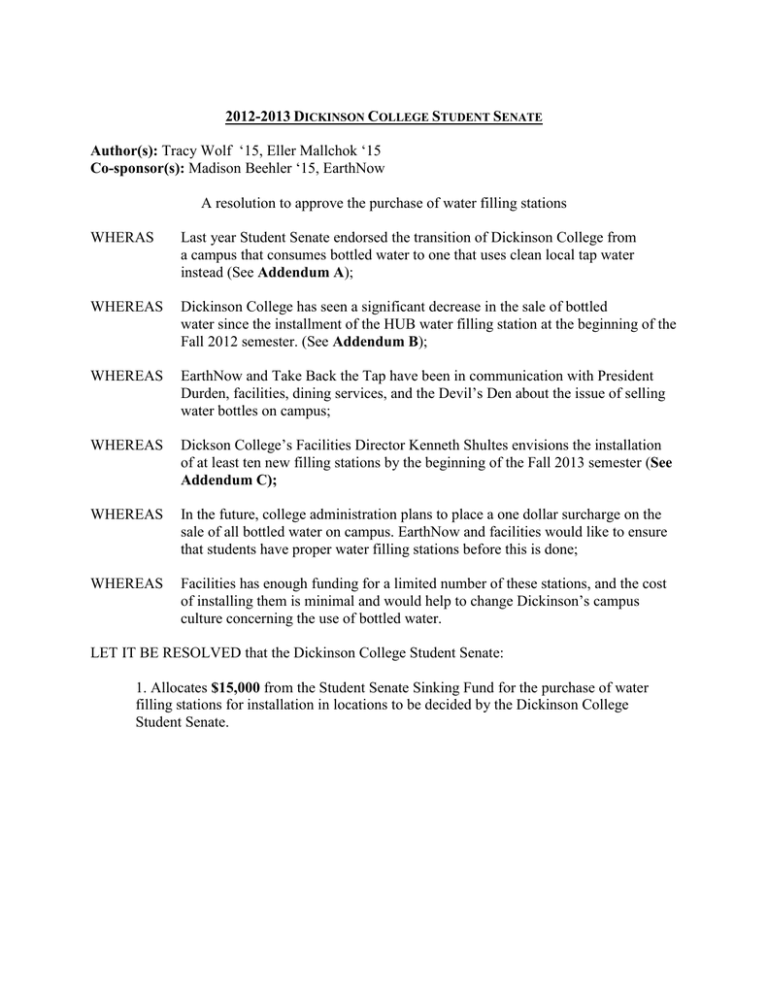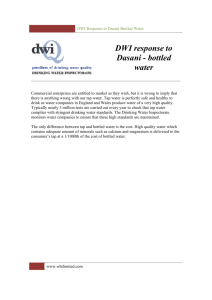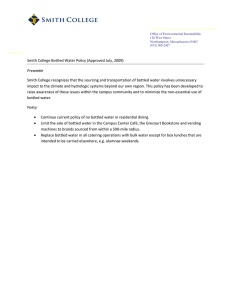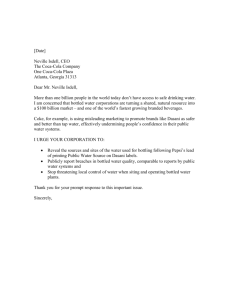Dickinson Senate: resolution approving the purchase of water filling stations
advertisement

2012-2013 DICKINSON COLLEGE STUDENT SENATE Author(s): Tracy Wolf ‘15, Eller Mallchok ‘15 Co-sponsor(s): Madison Beehler ‘15, EarthNow A resolution to approve the purchase of water filling stations WHERAS Last year Student Senate endorsed the transition of Dickinson College from a campus that consumes bottled water to one that uses clean local tap water instead (See Addendum A); WHEREAS Dickinson College has seen a significant decrease in the sale of bottled water since the installment of the HUB water filling station at the beginning of the Fall 2012 semester. (See Addendum B); WHEREAS EarthNow and Take Back the Tap have been in communication with President Durden, facilities, dining services, and the Devil’s Den about the issue of selling water bottles on campus; WHEREAS Dickson College’s Facilities Director Kenneth Shultes envisions the installation of at least ten new filling stations by the beginning of the Fall 2013 semester (See Addendum C); WHEREAS In the future, college administration plans to place a one dollar surcharge on the sale of all bottled water on campus. EarthNow and facilities would like to ensure that students have proper water filling stations before this is done; WHEREAS Facilities has enough funding for a limited number of these stations, and the cost of installing them is minimal and would help to change Dickinson’s campus culture concerning the use of bottled water. LET IT BE RESOLVED that the Dickinson College Student Senate: 1. Allocates $15,000 from the Student Senate Sinking Fund for the purchase of water filling stations for installation in locations to be decided by the Dickinson College Student Senate. Addendum A: Take Back the Tap Resolution Spring 2012 2011-2012 DICKINSON COLLEGE STUDENT SENATE Resolution Number: Introduced on February 28, 2012 Author(s): Eller Mallchok ’15, Timothy Damon ’12, Margaret Price ‘14 Co-sponsor(s): Matt Michrina ‘12 A resolution to express Student Senate support for a Dickinson campus that reaps the economic, social, and environmental benefits of not using bottled water. WHEREAS Dickinson College currently consumes 45,024 bottles of water per year; WHEREAS at the Dickinson sale price of $1.50 per bottle, this amounts to $67,536 spent each year; WHEREAS the Borough of Carlisle’s municipal water treatment facility was the first in Pennsylvania, and only the eighth in the country, to receive the Excellence in Water Treatment Award from the Partnership for Safe Water; WHEREAS the standards for water quality are less stringent for privately bottled water than for water provided by public utilities; WHEREAS using clean local tap water instead of bottled water would have numerous social, economic, and environmental benefits (see Addendum A); WHEREAS coursework from ECON 222 Environmental Economics supports this proposal (see Addendum B); WHEREAS over 700 students have signed a petition in support of ending the sale of bottled water on the Dickinson College campus. LET IT BE RESOLVED that the Dickinson College Student Senate: 1. Endorses the transition of Dickinson College from a campus that consumes bottled water to one that uses clean local tap water instead. First Reading on February 28, 2012 Addendum A The benefits of switching to clean local tap water over bottled water from afar: Social Benefits: Higher health standards Water is available to students at significantly lower cost (more equitable) Shows support for the Carlisle community Economic Benefits: The College saves money that can go to other things students want Students themselves save money and can spend it on other things Greatly improves resource efficiency Environmental Benefits: The College will produce less waste Less pollution from manufacturing and trucking bottled water Promotes utilization of local resources and clean water sources Other College-Specific Benefits: Boosts Dickinson’s reputation for sustainability (good for Admissions, everyone) A step toward commitment of becoming “carbon neutral” Etc. Addendum B Take Back the Tap: Improving Dickinson’s Economic, Social, and Environmental Sustainability A Proposal by Timothy Damon ‘12 ECON 222: Environmental Economics Professor Sebastian Berger February 23, 2012 Goal: To transition Dickinson from a campus that consumes bottled water to one that uses clean local tap water instead, thereby providing a range of economic, social, and environmental benefits for the College. Rationale: This project has its roots in principles from ecological economics perspective. All human activity transforms natural resources into waste products to provide economic goods and services. Since natural resources are limited by quantity and rate of availability, the human economy must consider the optimal scale for its activity, while seeking to do so as equitably and efficiently as possible (in that order). The case of bottled water: Bottled water requires the use of plastic made from non-renewable oil stocks. Oil is essentially solar energy that was trapped (through photosynthesis) as organic matter millions of years ago, thus its use has allowed human activity to consume energy at a much faster rate than what the sun provides annually. Consequently, making bottled water not only depletes an irreplaceable resource but is also one of countless examples of humans living beyond their natural means (a lifestyle that is rapidly burning through all the savings in our solar bank account). Studies have also found that bottled water is not free from contamination (as many believe) and its quality standards are actually less strict than those that regulate public water utility. The case of Dickinson: Dickinson consumes over 45,000 bottles of water each year. In addition to the bottles themselves, this activity consumes resources for shipping (more oil) and generates pollution during both production and disposal – even recycling bottles consumes more energy, which mostly comes from fossil fuel sources. Spending money for bottled water is absurd when one considers that the College has locally available water of nationally-recognized quality right here in Carlisle. The benefits: Switching to clean local tap water will, inter alia, save money (for both the College and students), reduce Dickinson’s environmental impact, conserve natural resources, promote the local community, improve water quality, and boost the College’s reputation for sustainability. Conclusion: This project is entirely a matter of policy. While there are complementary improvements that could be made to the physical infrastructure of the campus, taking back the tap is primarily about awakening to the reality of the implications associated with where we get our water. The clear choice is to move in the direction of greater economic, social, and environmental sustainability. (See graphics below) Compare, if you will, the Bottled Water System Dickinson currently has with the Tap Water System it could have. Which would you prefer? Addendum B: Water Bottle Sales in the Devil’s Den Bottled Water Sales/September, 2012 (With Filling Station in HUB) Bottled Water Sales/April, 2011 (Pre Filling Station in HUB) Deer Park 16.9 Ounce Deer Park 1 Liter Deer Park 1.5 Liter Deer Park 3 Liter 812 1326 454 109 Deer Park 16.9 Ounce Deer Park 1 Liter Deer Park 1.5 Liter Deer Park 3 Liter 703 928 562 127 Pure Life Gallon 262 Pure Life Gallon 221 Smart Water 20 Ounce Smart Water 1 Liter 378 508 Smart Water 20 Ounce Smart Water 1 Liter 179 459 Dasani 20 Ounce Dasani 1 Liter 143 143 Dasani 20 Ounce Dasani 1 Liter 140 177 Aquafina 20 Ounce Aquafina 1 Liter 101 23 Aquafina 20 Ounce Aquafina 1 Liter 59 15 Totals: 4259 Difference of 689 water bottles 3570 Addendum C In an email confirmation from the director of facilities Ken Shultes, facilities plans on doing the following: Placing a $1.00 sustainability surcharge on all water bottle sales in Dining Services locations, Devil’s Den, Vending Machines. They plan on initiating the program at the beginning of the Spring Semester. They will not initiate the surcharge until we add water fill stations in strategic locations. They will continue to add fill stations over time as budget permits. If Student Senate is able to fund some of the fill stations, that would be terrific. We seek endorsement of the plan from Senate, Earth Now, Idea Fund Sample location options for indoor water filling stations: HUB lower level Library (Biblio area) Rector Atrium Area Quarry Adams Drayer Morgan Kline Fitness Center Davidson-Wilson Baird Library Basement Library Upstairs Bosler Denny East College Locations for outdoor water filling stations: Academic Quad Quad Dorms Area. Morgan Field Sample Outdoor Water Filling Stations A resolution to approve the purchase of water filling stations QuickTime™ and a decompressor are needed to see this picture. QuickTime™ and a decompressor are needed to see this picture. QuickTime™ and a d eco mpres sor are nee ded to s ee this picture.



